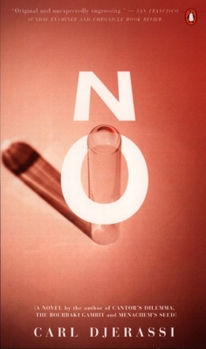No
Select Format
Select Condition 
Book Overview
A compelling novel based on the high-stakes biotech industry and the science behind Viagra from the internationally known "Father of the Pill." The fourth installment of Carl Djerassi's pioneering "science-in-fiction" tetralogy tells the story of a husband and wife team who devise new solutions to problems associated with sex and reproduction. Renu Krishnan is an Indian-born, American-educated scientist who discovers how NO (nitric oxide) can help men with erectile dysfunction--the scientific rationale behind Viagra. At the same time, her husband, Israeli scientist Jephtah Cohn, develops a new approach to ovulation prediction, which is also based on factual research. When Wall street gets wind of their discoveries, the couple catapults in the fast paced world of lawyers and IPOs, where scientists are now a hot commodity. Deftly exploring the demanding worlds of academia and high finance, Djerassi brings back many characters from his three earlier novels for a satisfying conclusion.
Format:Paperback
Language:English
ISBN:0140296549
ISBN13:9780140296549
Release Date:November 2000
Publisher:Penguin Adult Hc/Tr
Length:288 Pages
Weight:0.55 lbs.
Dimensions:0.6" x 5.1" x 8.3"
Age Range:18 years and up
Grade Range:Postsecondary and higher
Customer Reviews
4 ratings
The convergence of academics and business
Published by Thriftbooks.com User , 26 years ago
The literature of Carl Djerassi focuses mostly on the dilemmas and complications that surround the world of academics and science. In NO, he delves further into this problem by connecting it to the development of a business venture that spawns from an academic setting.Djerassi brings in NO a myriad of situations that arise from this. These include the roles of women in academics and business and the ethics behind reproductive issues. While most of his previous literature focuses on the world of academia, NO is centered on the possible applications and implications of bringing a product of research into its application. NO is a great novel that masterfully places all of these elements together in a very enthralling way.
A great insiders view of the tribal behavior of scientists.
Published by Thriftbooks.com User , 26 years ago
New writers are advised "write what you know." For Carl Djerassi this includes a great deal. "NO" is the fourth and best of his science-in-fiction tetralogy. Here some of the characters from the earlier novels cross paths. The drama begun in "Menachem's Seed" is nicely played out here. The intervening years realistically stretching between the two novels.One of Djerassi's expressed goals is to explore the tribal behavior of working scientists. As a working scientists myself, I can vouch for the validity of much of the behavior Djerassi has described. The establishment of a biotech company introduces a new vocabulary to science - SAB, MAB, IPO, options, blackout periods, et cetera. There is also a change in the focus and priorities for the research to be conducted. It's not a case of "good science" versus "bad science" but a case of science-as-a-part-of-business versus science-as-a-part-of-academia. In either setting the science can be good, high quality science or, bad, low quality science. But good, high quality science in a business setting is managed differently from good, high quality science managed in an academic setting.In "NO" Djerassi explore this borderland between academic research and a biotech enterprise. Djerassi brings a fresh voice to this topic. The science is solid and intelligible. The characters are realistic and face realistic dilemmas in the lab and outside of the lab. The pressures of money, prestige and trying to live a normal human life are all there. We scientists don't come off as a bunch of out-of-touch-nerds or a bunch of head-in-the-clouds idealists. Well, OK, maybe just a little of both, but only a little bit!I have worked in science for 28 years. Together these four novels have helped me understand some of the discomfort I have experienced in my career in science. Even though I like science and even though I do science well, I often don't like being in the company of scientists. These novels have helped me recognize and understand some of the tribal behaviors which I feel uncomfortable with. Within the tribe of scientists a Ph.D. is often the only birth certificate recognized. All of us B.S. or M.S. scientists are often treated as mere hands or head count, but seldom are we regarded as having much of a brain. That level of class structure was not explored in these novels. Perhaps it's not part of Djerassi's experience.
Excellent description of science discovery and marketing
Published by Thriftbooks.com User , 26 years ago
After I read Frances Brodsky's review of NO in Nature, I ordered the book. I enjoyed NO tremendously. As an academic viral immunologist who has serendipitously discovered the potency of NO as an antiviral in encephalitis, I found the science impeccable and tongue in cheek. The description of discovery, of testing, establishment of a company, FDA approval and ultimately marketing rang true. As a woman scientist, I found the travails of your protagonist valid. I only wish that love were so easy to obtain in my circles. This book was a terrific week's free time diversion!
The science is impeccable and presented tongue in cheek
Published by Thriftbooks.com User , 26 years ago
After I read Frances Brodsky's review of NO in Nature, I ordered the book. I enjoyed NO tremendously. As an academic viral immunologist who has serendipitously discovered the potency of NO as an antiviral in encephalitis, I found the science impeccable and tongue in cheek. The book was very well written, with engaging characters. As a woman scientist, I found the travails of the protagonist valid. I only wish that love were so easy to obtain in my circles. The complexities of establishing a biotech company as well as sheparding a product through the FDA are illustrated in the plot, as well. Thank you for a week's free time diversion!





